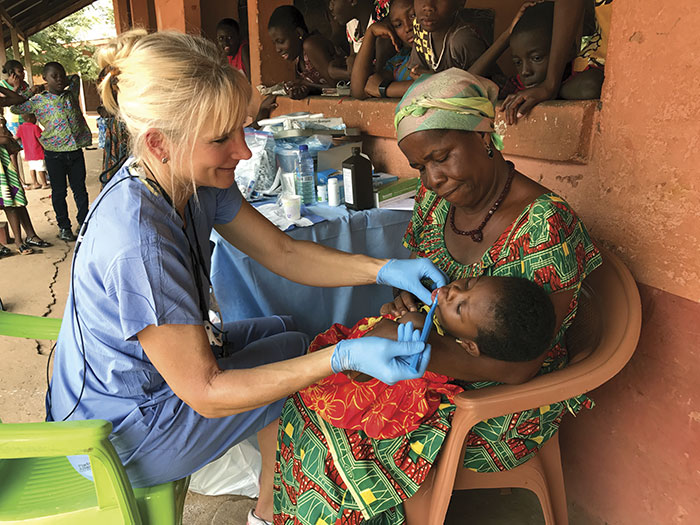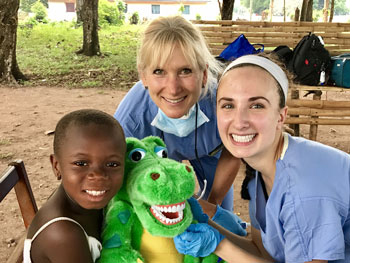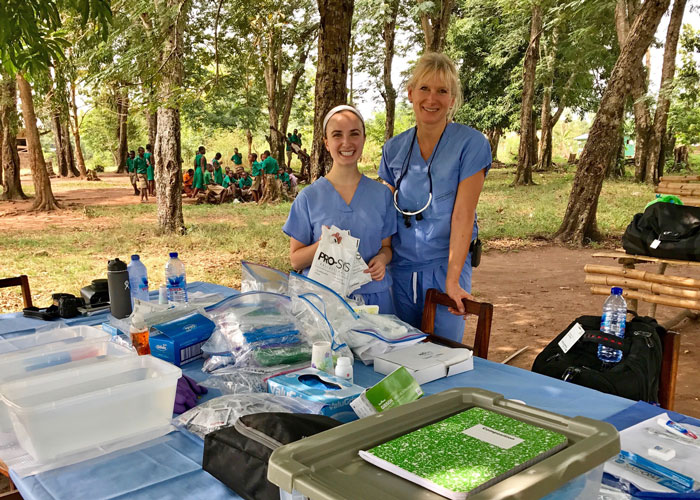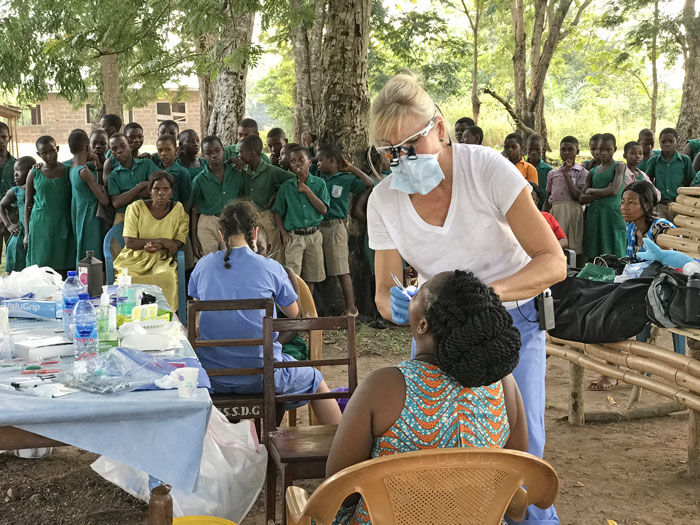| The Inspiring Life of Dr. Julie Spaniel | ||||||||
| by Susan Z. Ritz | ||||||||
For Dr. Julie Spaniel, DDS, dentistry is about a whole lot more than cleaning teeth and casting crowns. Spaniel, who has owned her own practice, Sprucewood Dental in South Burlington, for 22 years, says, "It's not about teeth, it's about humanity, it's about people." That attitude has kept her Vermont practice thriving and motivated her to volunteer in Ghana, Honduras, Nicaragua, and here in Vermont with the growing refugee community. "And," she adds, "for women, dentistry is a wonderful field." For Spaniel and the 15 women who make up her practice, the field offers financial rewards along with the freedom and flexibility to raise a family and follow dreams. Spaniel, 51, a Michigan native, became a dentist because she viewed it as a means to combine her interests in health care, science, and art. "All dentists are artists," she explains. "We create smiles with our hands. I actually build teeth." Back in the '80s, however, she was one of only two women pursuing dentistry at the University of North Carolina Chapel Hill. "Women have gotten a bad rap. They often counted as only half a dentist because they're going to go off and have kids." Spaniel laughs at that notion. She raised four children, now in their teens and twenties, while working full-time. "I would bring them to the office in their car seats. Sometimes I'd get a babysitter to help." Many of her employees are raising families now and take advantage of the job-sharing options offered at Sprucewood. As a member of the American Academy of Oral Systemic Health, an organization made up of both dentists and doctors, Spaniel seeks to create awareness that the mouth is actually connected to the body. "Basically, the most virulent bacteria that you find in the body is located in the mouth. If you don't keep your mouth clean, then the gums become inflamed and bleed, creating a wide-open door for that bacteria to get into the bloodstream, getting into the whole body. Heart. Lungs. Artificial knees. When that happens, you end up with problems like heart disease. When a body has lots of inflammation, it often started in the mouth. That's why it's so important to brush and floss two to three times a day and get regular cleanings from your dentist." Spaniel's holistic approach to dental health and emphasis on continuing education in dental technology both contribute to the success of her Vermont practice, which now serves several thousand active patients. The real secret to her success, however, is the relationships she has built over the years. "I love to visit with my patients I've known for 20 years. They're friends of mine. I've seen them grow up and have families of their own. The reality is you can have your teeth cleaned and cavities filled anywhere, but if you can go into a place where you see the same faces each time, you feel as if the practitioners have your best interests at heart. They care about you, not just your teeth and your mouth."
Managing a successful business might seem like a fulfilling career in itself, especially for a busy mother and wife like Spaniel. However, this seemingly indefatigable woman is also a dedicated volunteer, taking her skills to underserved communities as far away as Africa and as close to home as Burlington. "I started my career with service work, learning that by giving away whatever your services are, taking your generosity to people who might only be able to pay you with their smiles, creates a more balanced life." While still in dental school, Spaniel began her volunteer work in a women's correctional institution in Raleigh. "We would also take a motor home equipped with dental chairs into these rural pockets of North Carolina." She followed these experiences with externships in Detroit's inner city and on a Cherokee Indian reservation. After graduation, she moved to Portland, Oregon, where she continued to pair her professional work at the Veteran's Administration with more service work. There she also met her husband of 22 years, Adam Tarr, founder of New England High Purity, a tech company he has since sold but still works for. She convinced him to move to Vermont for the quality of life. "I told him Vermont was similar to Oregon, very forward thinking and progressive with mountains, hiking, skiing, all the outdoor things, only on a smaller scale. He said he'd try anything for five years. That was in 1992, and we're still here."
In Vermont, her service work took an international turn about 10 years ago when she volunteered for the Shelburne/Charlotte Rotary Club's program Hands to Honduras. "They asked me to come do a dental clinic. I brought along equipment I'd used in earlier service work to extract teeth as well as toothbrushes, toothpaste, floss, and oral hygiene instructions in Spanish so we could teach the children how to brush their teeth." She discovered that the rural Hondurans also needed to learn about diet and nutrition to improve their oral health. "We found in Honduras that it's cheaper to buy Coca-Cola than a bottle of water, and that tap water was unsafe to drink. Even babies carry Coke around." The sugary soft drink contributes to severe tooth decay in an area where dentists are a rarity. Returning to the same community year after year, she realized that just coming in for a week to extract teeth was not going to do the job. "What if we started to educate young people to help? We brought Honduran high school students from the Tela American School to help us as interpreters and then taught them how to give oral hygiene instruction. They carry on after our team leaves." Now the community has a sustained clinic run by new dentist, a young Honduran woman inspired by Spaniel, who came to Vermont to study at St. Michael's and then Rider University in New York. "The joke is that Julie tries to make everyone a dentist!" Spaniel says with a laugh. The daughter of a United Airlines pilot, Spaniel grew up traveling the world, so she had no qualms about venturing to far-flung countries. "It's better to try to go places where other people don't. When you travel, the horse blinders are off. You see things for what they are, not for what you're spoon-fed and made to fear by our media." When her own son, Nick, now 25, signed up to go to rural Nicaragua and later to Ghana with Global Brigades, a student-led organization that bills itself as "the largest movement for global health and holistic development," Spaniel encouraged him and went along as a volunteer herself.
The first stop for Meyer and Spaniel was a church. While congregants danced in their finest attire, the team set up their dental shop. Over 200 children lined up for exams and cleanings. With Meyer learning on the job, they were able to see the entire crowd. Meyer's blog on the R.O.C. website reports, "I walked away from that first day with a new sense of purpose. This was the first time on this trip where I was able to see a physical acknowledgement of the work I was doing. Every child walked away with a better sense of oral health, smiling with gleaming teeth and completely pain free." The furious pace continued throughout the week as they moved from village to village, working at schools treating villagers of all ages. Once again, Spaniel realized that a sustained presence was needed. "The last thing we want to do is go into an area and then leave them without support," says Spaniel. In January 2018, she and Meyer will be returning to the Have region of Ghana with a group of health-care providers through the auspices of R.O.C., for which Spaniel is now director of the International Health Care Division. "We'll bring a physician, someone for a women's clinic, a dentist or two. We're buying or renting a building, something sustainable where we have not only dental but other health care workers come in and use the facility for a holistic approach to health care for communities there." Their efforts will be supported by USAID and the Ghanaian organization Oral Health Care Express.
Back in Vermont, Spaniel has also been busy volunteering to help refugees in the Burlington area. "When I went to get my shots for the trip to Ghana at the UVM travel clinic, I ran into a friend who said 'Gosh, it's too bad you can't do more work in our area because there's so much need here.' I said absolutely I can do more work here!" The result was the first Refugee Free Dental Day on March 25, and it has been followed by several other dental days attended by new Vermonters from Congo, Somalia, Nepal, Iraq, Burundi, and Nigeria. Many of the refugees were drawn to the Free Dental Day because they were invited to choose some of the furnishings and other donated necessities Spaniel collected in her flatbed truck. She now has two storage units full of household goods, shampoo, dishes, pots, and pans. "Refugee Resettlement does what they can, but we can supplement," she notes. With no more refugees arriving due to Trump's ban, the units are now overflowing into her garage and office, where many of her patients drop off donations.
Spaniel has made close connections with several refugee families and helps in many ways beyond dental care and donated goods. Currently, an Iraqi teenage girl with severe PTSD is attending therapeutic riding sessions at Spaniel's farm, where, on top of everything else she does, she stables eight horses and several brood mares. Her daughter, Emily Tarr, 22, who attends St. Michael's College, helps her with the program. Some Vermonters have asked why she doesn't work for the rural poor in the state. Spaniel says, "Certainly that's needed, but I can be most helpful in the refugee community because I know the situations they are coming from. I understand these refugees so well because I have lived in their previous situations, with no running water, no electricity, no nothing. I understand the appropriate questions to ask and what the conditions were that contributed to their needs. We need to pick where we can each help most. Maybe its COTS, maybe the Food Bank, but if everybody in the world helped just one person, look how many would be helped."
"Somebody once asked me, 'Julie, don't you feel overwhelmed?' Sometimes, but I just do one thing at a time, one hour at a time. I go to other countries where they have so little, but people are so happy. Then I come back here and people are complaining and entitled. I say if you're miserable, go inside yourself. If you want something give it away. Want respect? Give it away. Want happiness? Give it away. Whatever it is, it comes back to you. People are always searching for happiness, but you don't go looking for happiness out there. You go make someone else happy. Doesn't cost you a cent. When you understand that, you'll find happiness in service. To quote one of my favorite movies, Kung Foo Panda, 'If you only do what you can do, then you'll never be better than who you are.'" Through her dental practice and her far-reaching volunteer service, Dr. Julie Spaniel shows her large circle of friends, family, and patients across the world how to put that quote into practice for a happy and rewarding life.
|
||||||||
|
Susan Z. Ritz lives, works, and writes in Montpelier.
|
|||||||





